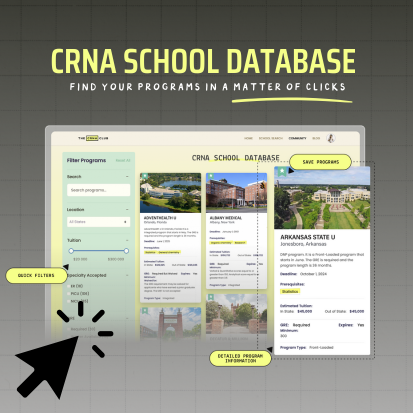Burnout is described by Merriam-Webster as a state of physical or emotional exhaustion that is usually caused by prolonged stress or frustration. CRNA school is often described as one of the most challenging journeys in healthcare education. With long clinical hours, demanding coursework, and the pressure to excel, it’s easy to feel like you’re just surviving day-to-day. But thriving as a student registered nurse anesthetist (SRNA) is not only possible—it’s essential for your well-being and success.
Take it from me—there’s nothing quite like realizing you’ve been walking around the hospital with your scrub top on inside out because you were too sleep-deprived to notice at 4 a.m. (True story. Bonus points if you’ve also introduced yourself to the attending as “Hi, I’m a… um… student… wait, no, SRNA!”). Moments like these remind us that no one’s perfect, but we can still find humor and humanity in the chaos.
In this blog, we’ll explore practical strategies to manage stress, stay motivated, and maintain balance during this intense chapter of your career. From time management tips to self-care routines and finding your support network, this guide will help you build resilience and focus on your ultimate goal: becoming a confident, compassionate CRNA. Let’s shift from merely surviving to truly thriving!
Key Strategies to Avoid Burnout
1. Master Time Management: Prioritize tasks, create a study schedule, and set realistic goals.
In CRNA school, time emerges as your most precious—and limited—resource. Time to use that Instacart membership to save time on grocery shopping. Haha.
Balancing clinical hours, coursework, and personal commitments can feel daunting, but you can conquer it all with a well-crafted strategy. Begin by prioritizing tasks based on their urgency and importance, ensuring that critical deadlines and high-yield studying take the spotlight. Develop a study schedule that transforms significant goals into smaller, manageable tasks, empowering you to avoid last-minute cramming. Keep in mind that setting realistic goals is essential; striving for too much too quickly can lead to burnout. Embrace the journey, and remember that you can shape your success.
Time Management Tips:
- Use a planner or digital calendar to schedule daily, weekly, and monthly tasks.
- Dedicate specific time blocks for studying, clinical prep, and personal activities.
- Start each day by identifying your top three priorities and focusing on completing them.
- Limit distractions by setting phone or app timers to stay on task.
2. Self-care Practices: It is important to emphasize physical health (exercise, nutrition) and mental health strategies (meditation, taking breaks).
Thriving in CRNA school requires more than academic success—it requires taking care of your physical and mental well-being. Incorporate regular exercise, even if it’s just a quick 20-minute workout, to boost your energy and focus. Plan balanced, nutrient-rich meals to fuel your body for long hours in the OR and classroom. For mental health, mindfulness techniques like meditation or deep breathing can help alleviate stress and improve concentration. Don’t underestimate the power of taking a break; even short pauses during a hectic day can reset your mindset.
Self-Care Tips:
- Pack healthy snacks and hydrate throughout long clinical days.
- Schedule short, intentional breaks during study sessions (try the Pomodoro Technique!).
- Practice gratitude journaling to shift focus to the positives amidst challenges (super helpful on tough days!).
- Make sleep a non-negotiable priority whenever possible (Doomscrolling?).
*Check out Nali A.s blog about “Stress Management” for additional tips!
3.Build a Support System: It is important to have peer support and seek mentorship from faculty and experienced CRNAs.
No one succeeds in CRNA school alone—it truly takes a village. Surrounding yourself with a solid support system of peers, mentors, and faculty can make the tough days more manageable and the successes even sweeter. Fellow SRNAs understand your challenges better than anyone, so lean on each other for study tips, encouragement, and sometimes just a vent session. Additionally, seeking mentorship from faculty or experienced CRNAs can provide valuable insights, guidance, and inspiration as you navigate your training.
Support System Tips:
- Form a study group to share resources and stay accountable.
- Schedule regular check-ins with a mentor to discuss progress and challenges.
- Engage in professional networking through local or national CRNA organizations.
- Don’t hesitate to ask for help or advice—your network is there!
Becoming a Certified Registered Nurse Anesthetist (CRNA) can be exciting and challenging. It’s essential to recognize that you’re not alone in this process; many before you have faced similar hurdles and emerged stronger. By adopting the strategies we’ve discussed, you can find the support and tools needed to confidently navigate this path. Whether developing effective study habits, connecting with a mentor who understands your experiences, or ensuring you take time for your well-being, every small step can make a difference. Embrace this journey with an open heart and mind, knowing that with determination and the right approach, you have the potential to thrive in this rewarding profession.




